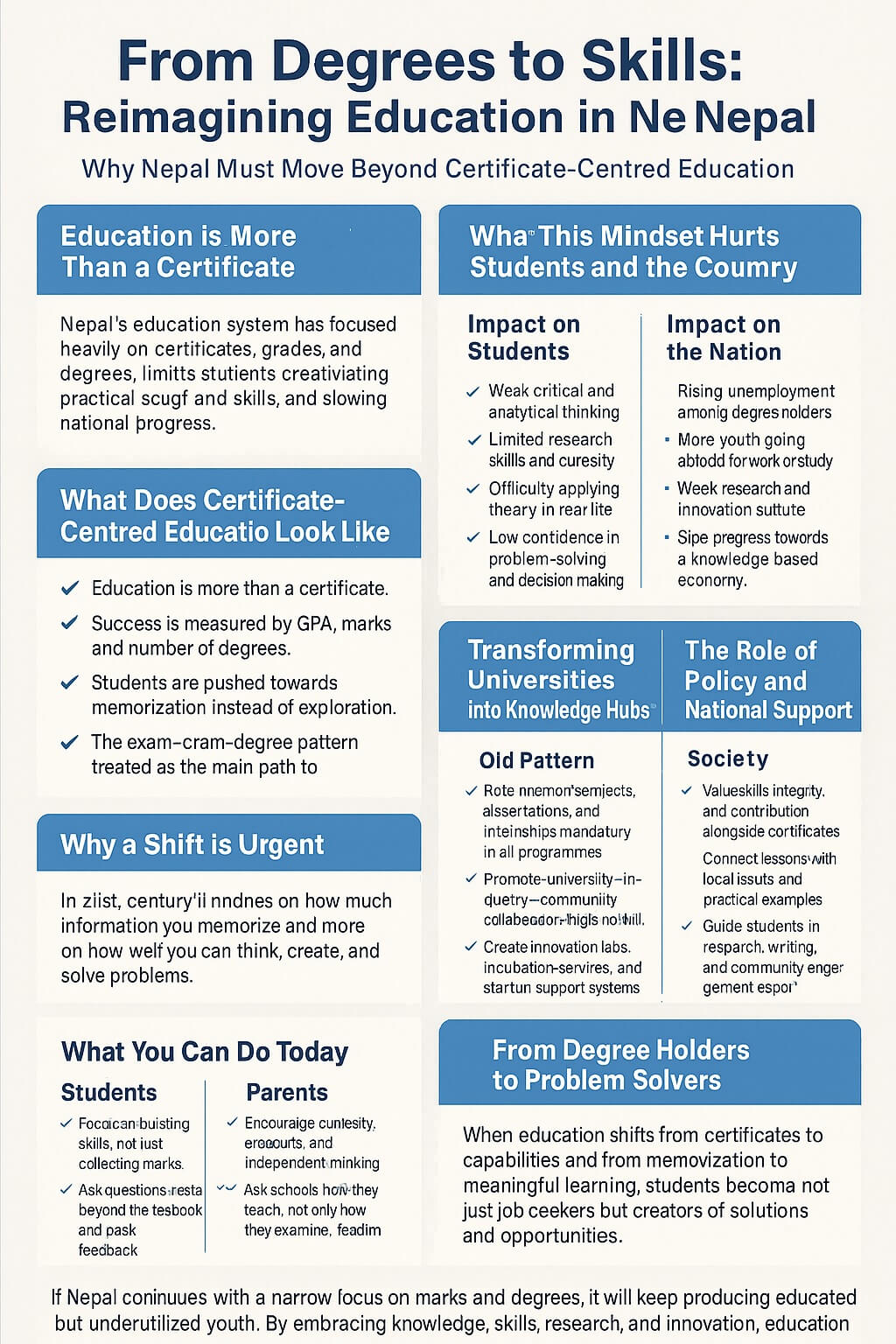
Beyond Degrees: Reorienting Nepal’s Education Towards Knowledge, Skills, and Innovation
The current education system has lived for decades under a certificate-centred mindset. Academic success is often measured less by what students can actually do and more by how many certificates they accumulate and how high their GPA looks on paper.
When learning is reduced to marks and degrees, students’ original thinking, research orientation, creativity, and problem-solving ability slowly erode. At the same time, the country loses the very human capital it needs to move towards a knowledge-based economy.
John Dewey famously said that education is not preparation for life; education is life itself. For Nepal, this idea is no longer philosophical luxury—it is a practical necessity. Students now need far more than paper credentials. They need practical skills, entrepreneurial thinking, and the confidence to create their own opportunities.
If you are a student, parent, teacher, or policymaker, the key question is simple: Will our education remain focused on distributing degrees, or will it become a system that creates knowledge, innovation, and life-ready skills?
The Problem: Certificate-Centred Thinking in Nepal
A large part of Nepal’s education culture still revolves around degrees. Many people see education mainly as:
-
A way to obtain certificates for job applications
-
A ladder to government or office jobs
-
A status symbol for families and communities
As a result, assessment focuses on:
-
How many exams you passed
-
How high your GPA looks
-
How quickly you can complete each level
Instead of asking, “What did students learn, build, or improve?” the system often asks, “What score did they get?”
This has several visible consequences:
-
Students are pushed into rote memorisation instead of inquiry.
-
Learning becomes exam-driven instead of curiosity-driven.
-
“Success” is defined narrowly as degree + job, rather than contribution, character, or creativity.
You see this reflected in the classroom. Many students:
-
Memorise textbook answers without understanding concepts
-
Hesitate to ask questions or challenge ideas
-
Focus on past question sets rather than real-world problems
Such learning rarely develops the kind of thinking needed to solve social, economic, or technological challenges.

How a Certificate Mindset Hurts Students and the Nation
When education is dominated by degrees and marks, both individuals and the country pay a price.
1. Weak connection between knowledge and real life
Students may pass exams but struggle to:
-
Apply theories to actual work situations
-
Analyse new problems without ready-made answers
-
Transfer classroom learning to community or industry contexts
This gap between classroom and reality weakens confidence and employability.
2. Rising unemployment among degree holders
Universities are expected to produce skilled, adaptable, and innovative graduates. Instead, many institutions still:
-
Rely heavily on lectures and textbooks
-
Give limited exposure to fieldwork or internships
-
Treat research as optional rather than central
As a result, many graduates hold degrees but lack:
-
Practical skills
-
Project experience
-
Entrepreneurial and problem-solving abilities
This contributes to:
-
Unemployment or underemployment among degree holders
-
Increased attraction towards foreign employment
-
Ongoing brain drain of capable youth
3. Weak research and innovation culture
Universities should be centres of knowledge creation, but in Nepal:
-
Research funding is limited
-
Incentives for faculty and student research remain weak
-
Infrastructure for labs, innovation centres, and journals is insufficient
Without strong research and innovation ecosystems, universities struggle to respond to national needs—whether in agriculture, health, technology, education, or governance.
What Knowledge-, Creation-, and Innovation-Centred Education Looks Like
In the 21st century, success is shaped less by how much information you carry and more by your ability to:
-
Generate new knowledge
-
Solve complex problems
-
Create useful products, services, or social solutions
For Nepal, this means shifting from textbook-heavy, exam-driven education towards an approach that systematically builds:
-
Critical and analytical thinking – asking questions, examining evidence, and weighing alternatives
-
Creativity – designing new ideas, solutions, and approaches
-
Communication and collaboration – working effectively with others and presenting ideas clearly
-
Character and values – integrity, empathy, responsibility, and social consciousness
-
Practical and digital skills – using tools, technology, and methods relevant to modern work
Albert Einstein once remarked that education is not about learning facts, but about training the mind to think. Nepal’s education system now needs to embody this idea in curriculum, teaching, and assessment.
Transforming School Education: From Rote Learning to Inquiry
The roots of a knowledge-centred system begin in school. If students are locked into memorisation from early grades, universities receive learners who are conditioned to follow, not explore.
1. Make curiosity the starting point
Schools can help learners by shifting from:
-
“Covering the syllabus” → to exploring concepts deeply
-
“Completing exercises” → to investigating real questions
This can include:
-
Inquiry-based projects
-
Community-based assignments
-
Field visits and observation tasks
-
Classroom discussions where students present their own viewpoints
2. Integrate STEAM meaningfully
Science, Technology, Engineering, Arts, and Mathematics (STEAM) can help students:
-
Link theory to practice
-
Use multiple disciplines together to solve problems
-
Build confidence in experimenting and prototyping
Simple but structured activities—experiments, design challenges, coding basics, local data projects—can turn abstract concepts into hands-on learning.
3. Embed life-skills and values within the curriculum
Academic success alone does not create responsible citizens. Schools need to integrate:
-
Values and ethics
-
Leadership and teamwork
-
Emotional intelligence and resilience
-
Communication and conflict resolution
-
Financial and digital literacy
-
Social responsibility and community engagement
When these skills are integrated into regular lessons and co-curricular activities, learners begin to see education as preparation for life, not just for examinations.
Transforming Universities: From Teaching Factories to Knowledge Hubs
Universities, by their nature, should be centres of research, innovation, and knowledge transfer. For that, several structural shifts are needed.
1. Make research and practical exposure non-negotiable
Every programme—whether in management, humanities, science, or engineering—should treat research and field engagement as core components, not optional extras. This means:
-
Mandatory research projects and dissertations
-
Internships with industry, NGOs, government, or community organisations
-
Project-based and problem-based learning assignments
-
Joint projects with local governments and communities
When students interact with real settings, they learn to apply classroom theories to actual challenges.
2. Strengthen university–industry–community collaboration
A stronger relationship between universities, industry, and community—often called the triple helix model—creates shared innovation. In practice, this can look like:
-
Companies offering live projects, internships, or research problems
-
Universities providing research support and technical expertise
-
Local governments and communities sharing real issues that require solutions
Such collaboration helps students, institutions, and society at the same time.
3. Build innovation and entrepreneurship ecosystems
Universities can create structures that support students and young graduates who want to build something new, such as:
-
Innovation labs and maker spaces
-
Incubation centres for start-ups
-
Mentorship networks with experienced professionals
-
Seed funding or small grants for student projects
This encourages learners to see themselves not just as job seekers but as opportunity creators.
4. Move towards outcome-based education
Outcome-based education asks a simple question:
After completing this programme, what should students be able to do?
Programmes should define clear learning outcomes related to:
-
Knowledge
-
Practical skills
-
Social and ethical responsibility
-
Innovation and problem-solving
Assessment then needs to measure whether students can actually demonstrate these outcomes, not just recall information.
The Role of Government and National Policy
System-level reform requires sustained public commitment. Several steps are especially important:
-
Allocate a fixed share of higher education funding to research. For example, setting aside at least a small but clear percentage of the higher education budget specifically for research, innovation projects, and journals.
-
Develop strong research grant systems. Transparent, competitive grants can encourage universities and individuals to work on pressing national problems.
-
Support innovation and start-ups. Tax incentives, concessional loans, and recognition programmes can encourage entrepreneurship among educated youth.
-
Promote “brain gain” instead of just accepting brain drain. Many Nepali students and professionals abroad hold significant expertise. Policies that support their return, collaboration, or remote engagement can help bring knowledge and networks back into the country.
-
Update regulations and quality standards. Accreditation and evaluation systems should reward institutions that prioritise research, innovation, and employability—not just enrolment numbers and exam pass rates.
What You, as a Student, Parent, or Educator, Can Do
While policy and institutional reform take time, your daily choices already shape the culture of education.
If you are a student or learner
-
Focus on skills as much as on marks: writing, analysis, communication, digital tools.
-
Ask questions, seek feedback, and read beyond the prescribed textbook.
-
Join clubs, projects, and competitions that give you real-world exposure.
-
Look for internships, volunteering roles, and part-time work that add experience, not only income.
-
Treat each assignment as a chance to explore something meaningful, not just to score.
If you are a parent or guardian
-
Encourage your children to be curious, not just obedient.
-
Ask schools and colleges how they teach—not only what exams they conduct.
-
Value skills, character, and independence as much as certificates.
-
Support diverse career paths instead of pushing only for a narrow set of “safe” options.
If you are a teacher or academic
-
Design classes that invite discussion, projects, and problem-solving.
-
Use examples from local communities and current issues.
-
Guide students towards research, writing, and critical reading.
-
Collaborate with colleagues, industry, and community to enrich courses.
If you are a policymaker or institutional leader
-
Reward innovation in teaching and research through recognition and promotion systems.
-
Create spaces—physical and institutional—for experimentation and collaboration.
-
Listen to students, employers, and communities when designing programmes.
Conclusion: From Degree Holders to Problem Solvers
Nepal’s future will be shaped by a generation of young people who can think independently, question confidently, create responsibly, and research systematically. As long as students remain confined within the narrow frame of rote learning, marks, and degrees, their true capabilities stay compressed—and the country’s progress slows.
Education cannot remain a pathway only to certificates and formal jobs. It must become a process that:
-
Generates knowledge and innovation
-
Builds life-ready skills and values
-
Develops character, leadership, and social responsibility
-
Prepares learners to create opportunities, not just compete for existing ones
If we continue with certificate-centred education, we risk producing more “degree-holding unemployed youth” and deeper cycles of frustration and migration. If we commit to transforming education towards knowledge, skills, research, and innovation, students can grow into problem solvers, entrepreneurs, and nation builders.
When we shift our focus:
-
From certificates to capabilities
-
From degrees to contribution
-
From rote learning to research and reflection
-
From imitation to innovation
Nepal can move from being mostly a consumer of ideas to becoming a source of knowledge and innovation for others.
That shift starts with how you think about education, how students engage with learning, and how we collectively redefine what success in education really means.
Education

